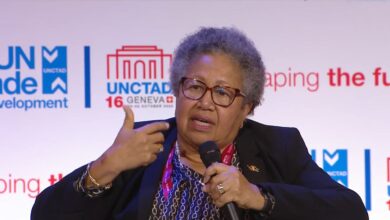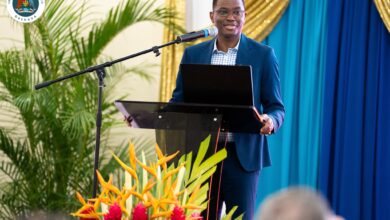It is my pleasure to make this statement on behalf of the Caribbean Community (CARICOM) on this the third Anniversary of World Telecommunications and Information Society Day which we commemorate today under the theme “Protecting Children in Cyberspace”.
New Information and Communication Technologies (ICTs) have irreversibly changed the world we live in by accelerating the pace and volume of innovation. This has fundamentally changed the way we transmit, receive, adapt and use knowledge and information.
Over the years these Information and Communication Technologies (ICTs) have brought with them both challenges and opportunities for our societies. They have changed the social and economic markets and radically altered the global communication and information- sharing space. We are now forced to live and work via this vast space which is sometimes referred to as the Internet but perhaps more aptly- cyberspace.
In many parts of the world today, children have access to information and ways of communication and expression that we could never have dreamed of years ago. The Internet gives them extraordinary opportunities to exercise their right to information, express their views and take part in society.
Children use the internet for research, to visit museums, play educational games, tour different countries and communicate with their counterparts around the world. In essence, the Internet is something very positive and useful, particularly for children.
Unfortunately, the Internet is also associated with risks, especially for children and young people. This technology has also allowed our nation's children to become vulnerable to exploitation and harm from pedophiles and other sexual predators. These perpetrators use the internet for such illegal acts as luring children into illicit sexual relationships and the widespread distribution of child pornography.
By now most of us are aware that globalisation is powered in part by tremendous and rapid ICT advances, and young people and children are often among the first to take advantage of new developments in this area.
Children today are surrounded by more information and communication technology than any previous generation. In the developed countries, practically every child lives in a home equipped with the basic tools of the information age, including the radio, television, telephone and, to an only slightly lesser degree, the stereo and video cassette recorder. The cell phone and the computer are now considered central appliances.
The picture is however, not the same for most children in developing countries. The “information revolution” has not spread to the world's one billion rural poor. While Internet use overall has been growing rapidly around the world, there are virtually no users among disadvantaged rural populations. Even when available, effective use of the Internet is impeded by high access costs, low literacy rates, low education levels, linguistic barriers and a general lack of relevant and contextualised content for improving livelihoods.
Internet technology has also allowed our world’s and the Region’s children to become vulnerable to exploitation and harm. Children and young people are often seen as innocent victims of the pervasive and powerful media and Internet.
Many view the breakdown of the nuclear family, teenage pregnancy, child trafficking and child prostitution spreading through the Internet, drug use, juvenile crime, the degeneration of manners, suicide and religious cults are all seen as problems exacerbated or even inflicted upon society by the spread of the Internet.
It used to be that children could be kept from harm by keeping them at home. Now, cyber-predators, child pornographers and other destructive elements can reach out to children who innocently spend time learning and playing on the family computer.
The proliferation of ICT has its obvious advantages and disadvantages. Consequently, we must seek to ensure that we plan strategically and carefully to exploit the power of the Internet as a people and as a Region.
We must ensure that we continue to protect the rights of our citizens including our children. We must also strive to ensure that they are afforded the same rights and privileges in both the ‘offline’ and online spaces.
The issues relating to child protection online are global and complex. Anyone can generate content for everybody else to see and access from all over the world. The production of child abuse material may take place in one country, the distribution may be hosted in other countries and material may be downloaded or accessed from all over the world.
The good news however, is that there are things we can do to protect our children online. To successfully combat child exploitation, we must be successful in three critical areas. Like any three-legged stool, we need a balanced approach to all three. If we neglect any one of them, the stool will fall and break.
• The first area in this approach is technology. There is some comfort in the fact that we can install parental control software on home and school computers.
From filtering software to educational video games, there are more ways than ever for children, young people and parents to keep themselves safe online.
With the proliferation of cell phones, Blackberries, iPhones, and other mobile devices, children of all ages now access the Internet from places besides their home computers.
We must ensure our online safety strategies keep up with technology and the ways our children access the Internet and interact with others online.
• The second area is education. Parents, teachers and caregivers will not always be there to keep children safe and the technology might not always be able to keep up. Predators and others who mean harm may always be able to outsmart parental controls.
Greater awareness and education at all levels, will help children to avoid the risks and pitfalls, and enable them to benefit from the extraordinary possibilities that the Internet provides.
Our next-best line of defense is education and this is something which we can start today.
• The third area is legislation and law enforcement. When technology and education are not wholly successful, we must ensure that we have a strong legislative safety net to support us.
Currently, in many CARICOM countries, this safety net does not yet exist. Our children are at risk because they can get unintentionally swept up in the booming multi-billion dollar online child pornography and sale industry.
We must ensure that as a region we develop coherent strategies which deal with the well-being and rights of children.
We must keep continuously before us the fact that we need to protect our children from the ills, offensive content and predators that exist in the same environment where our children seek information, education and entertainment.
A number of our Member States are signatories to the Convention of the Rights of the Child. However, we can do more – since other regions are now addressing specific legislation which deals with children’s rights and protection in cyberspace.
The involvement of all relevant stakeholders for information sharing and gathering will be critical to the success of these endeavours. We must broaden all efforts across national and regional borders and through broad alliances to make the world and the internet a safe, rewarding and educational experience for children.
As we commemorate World Telecommunication and Information Society Day, let us continue to recognise the enormous benefits ICTs continue to bring.
The Internet is a wonderful tool. It has opened up the world for our children. But it has also opened up our children to the world. Simply put, it's not enough anymore to teach our children how to handle dangers on the street. We must also teach them how to handle dangers on the Web.
We as members of governments, organisations and other associations, parents, public officials, representatives of NGOs, politicians – all have a responsibility. In different ways, we need to fight for the rights of children and against destructive behaviour towards them. Let us remember that our children are our heritage and their welfare is paramount to the survival, stability and future of the CARICOM Region.
Let us all therefore use this day to recommit to ensuring the safety of our children both offline and online.
Happy World Telecommunications and Information Society Day 2009 I thank you.





